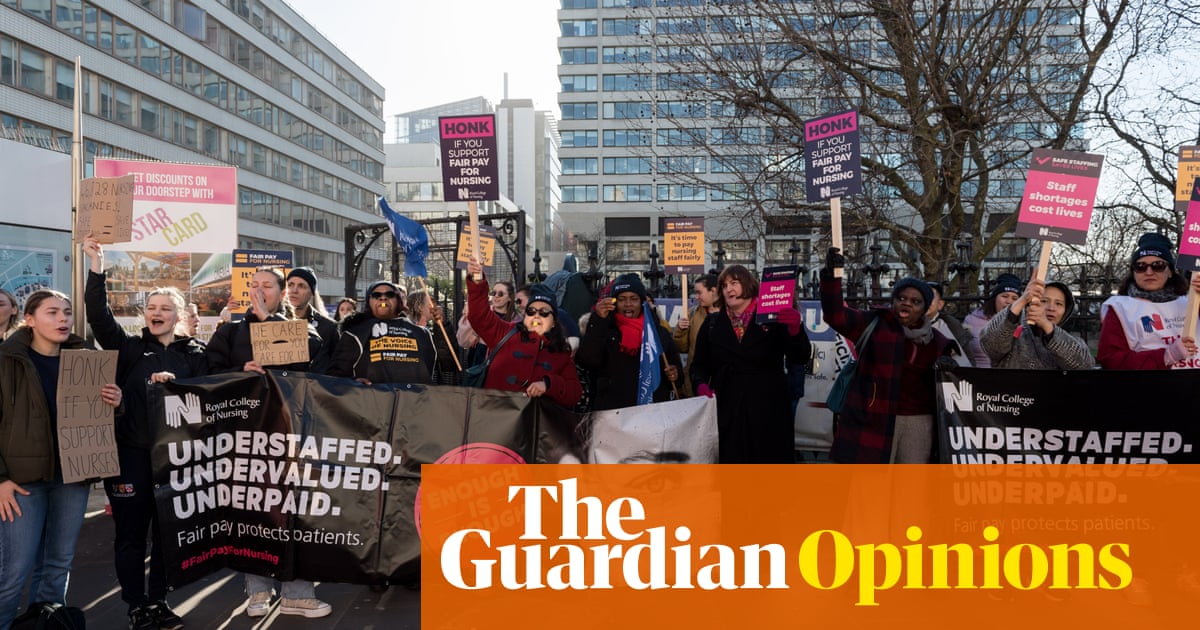
Britain is languishing, and the signs are everywhere.
Inflation is in double digits, and the recession — the worst of all Group of 7 countries — is expected to last deep into 2024. The National Health Service is on life support, public transport is sputtering, and post-Brexit worker shortages are widespread. Homeowners face soaring mortgage rates, renters are subject to no-fault evictions, and millions can’t afford to heat their homes. Food banks, which barely existed a decade ago, are at breaking point, and 14.5 million people are in poverty. Winter is here, and it’s bleak.
But Britons are fighting back. Months after what was called a hot strike summer, in which almost 200,000 workers staged walkouts, Britain is witnessing industrial action on a scale not seen in decades — and in all sorts of unlikely places. University staff members recently staged their biggest walkout, for example, and the Royal College of Nursing, which represents N.H.S. nurses, will soon take strike action for the first time in its 106-year history. The breadth of disputes is striking. Among those picketing or about to strike are postal workers, civil servants, charity workers, bus drivers, firefighters and factory workers.
The strikes, usually contentious, have unexpectedly captured the public mood. People go to picket lines and speak up for workers on television and radio phone-ins. Support, so far, is holding up: In August, three in five adult Britons backed industrial action, and polling in October showed 65 percent support for a nursing staff walkout. Rail strikes are less backed, especially with the approach of Christmas, but Mick Lynch, the leader of the transport union that has been at the forefront of strikes, has become an unlikely national hero. His refusal to accept things as they are, as well as his evisceration of hostile interviewers, has struck a chord.
Against those who insist that there is no alternative but to suffer, ordinary Britons are saying that, actually, there is — and it’s called solidarity.
Their defiance stands in stark contrast to the mood in Westminster. After weeks of political infighting and chaos, a solemn fatalism has taken hold there. To counter unsustainable levels of government debt and a global energy crisis, the argument goes, the country must make difficult decisions. As the finance minister put it before setting out a punitive budget last month, there is a “tough road ahead.” In these straitened times, everyone will have to make sacrifices for the good of the country.
Britain has heard that before. In the aftermath of the 2008 financial crash, politicians reached for similar arguments to justify cuts to state spending. Drawing on the figure of the welfare scrounger, assisted by an acquiescent media and compliant opposition party, the government persuaded the public that austerity was a reasonable response. This time, the approach isn’t working. According to the National Center for Social Research, 52 percent of people now think there should be more government support, not less. What’s more, fewer people now agree that welfare is too generous and prevents people from standing on their own two feet. After all, it’s hard to blame individuals for financial woes that are so widely shared.
Instead, another narrative is taking hold. In this version, the profound economic pain afflicting Britain is not acceptable or inevitable. Union leaders describe the cost-of-living crisis as a class war, effectively a money-siphoning opportunity for profiteering companies, facilitated by the government. The government’s refusal to countenance raising taxes on the very wealthy — something that, according to Tax Justice UK, an advocacy organization, could raise 37 billion pounds, or $45 billion, a year — in favor of stealth tax increases that hit low- and middle-income people is a case in point.
Abandoned by the government, people are stepping up. The Enough Is Enough campaign, started in August by trade unions, community organizers and legislators from the Labour Party’s left, has signed up 750,000 people and staged packed-out nationwide rallies. The campaign has five key demands: a real pay rise, an end to food poverty, slashed energy bills, decent housing for all and higher taxes on the highest earners. Organizers say they are reaching unlikely corners of the country, including Conservative strongholds, and the campaign is channeling supporters onto picket lines.
The grass-roots group Don’t Pay UK, set up in June, has taken things a step further. Undergirded by hundreds of support groups nationwide, 250,000 people pledged to start a coordinated national payment strike on energy bills on Dec. 1, joining the estimated three million who simply cannot pay their bills. Against criticism that nonpayment would inflict heavy penalties on the most vulnerable, the campaign seeks to provide collective support for people whose individual situations are often terrifying.
Seen as a whole, it looks like a public more prepared to stand together. Behind this sentiment, perhaps paradoxically, is the Covid pandemic. For one thing, it showed that — with political will — funds could be found to spend on public services and pay. For another, it forged such intense gratitude for nurses and other key workers that it’s now hard to dismiss their demands for better pay and conditions. Crucially, the experience of lockdown and widespread illness spawned thousands of mutual aid groups, premised on collectivism and reconnecting atomized communities. It’s this civic spirit that’s now being revived.
Four decades ago, Margaret Thatcher famously insisted that “there’s no such thing as society.” Perhaps Britain is finally ready to prove her wrong.
The New York Times












